小升初专项练习——形容词、副词(共24张PPT)
文档属性
| 名称 | 小升初专项练习——形容词、副词(共24张PPT) |

|
|
| 格式 | zip | ||
| 文件大小 | 5.8MB | ||
| 资源类型 | 试卷 | ||
| 版本资源 | 通用版 | ||
| 科目 | 英语 | ||
| 更新时间 | 2020-06-06 00:00:00 | ||
图片预览

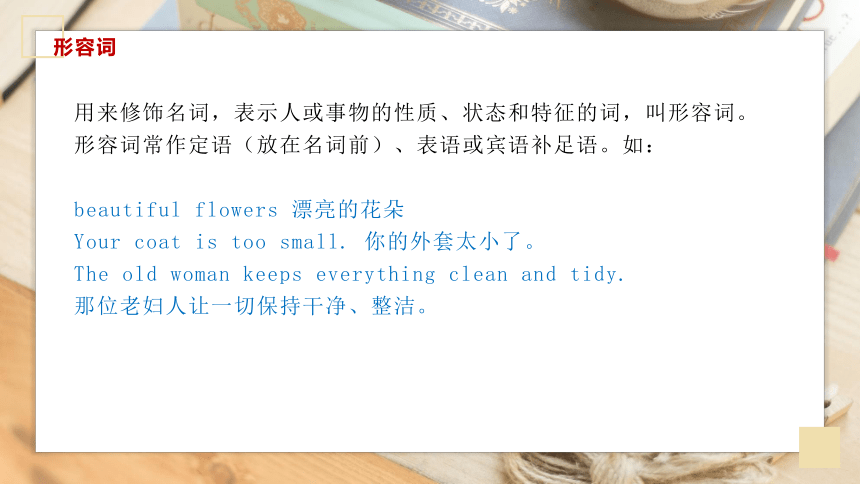
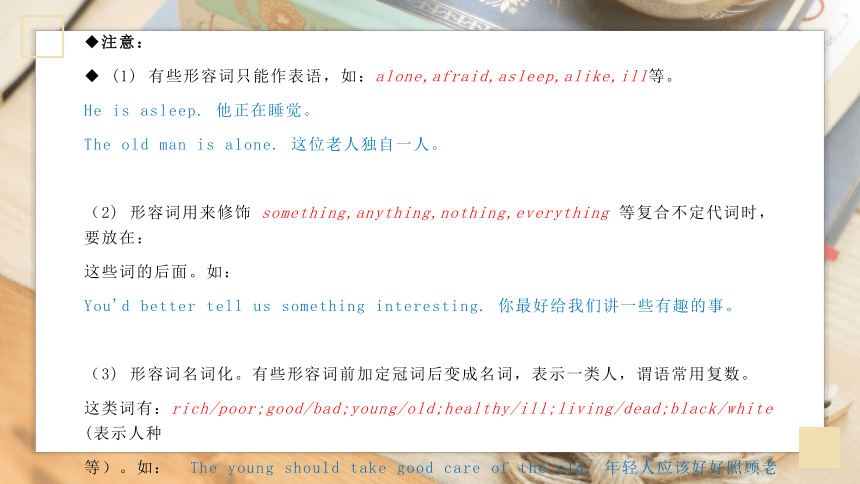
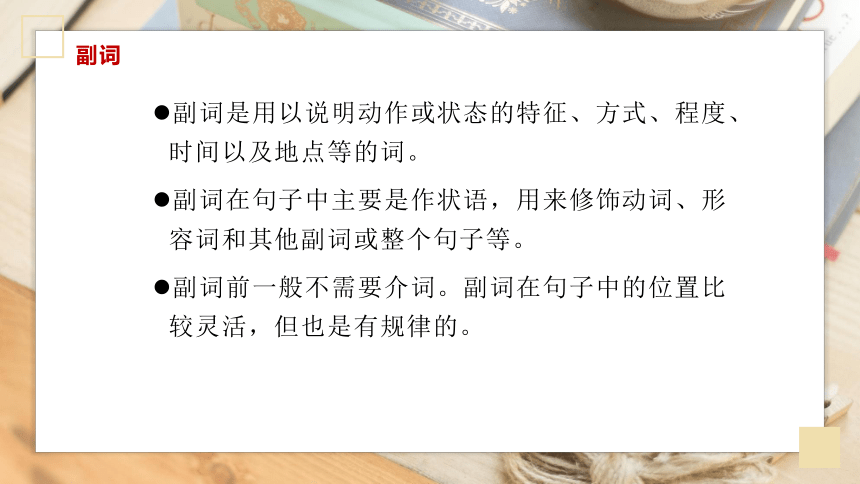
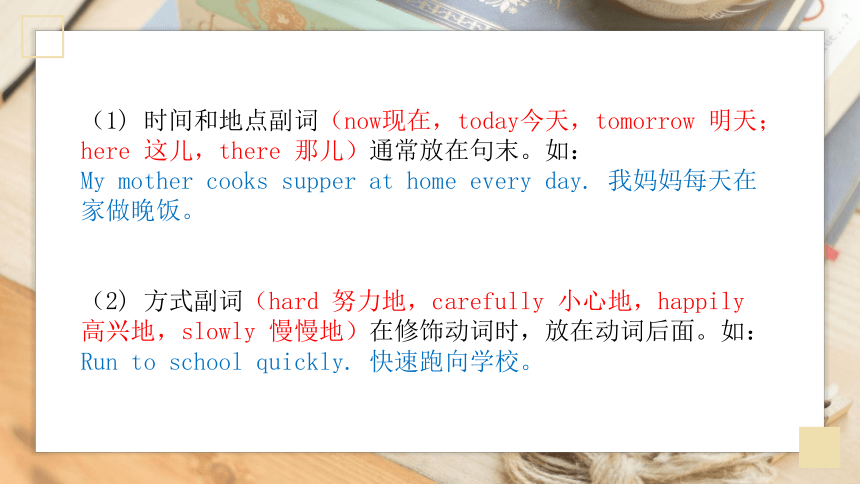

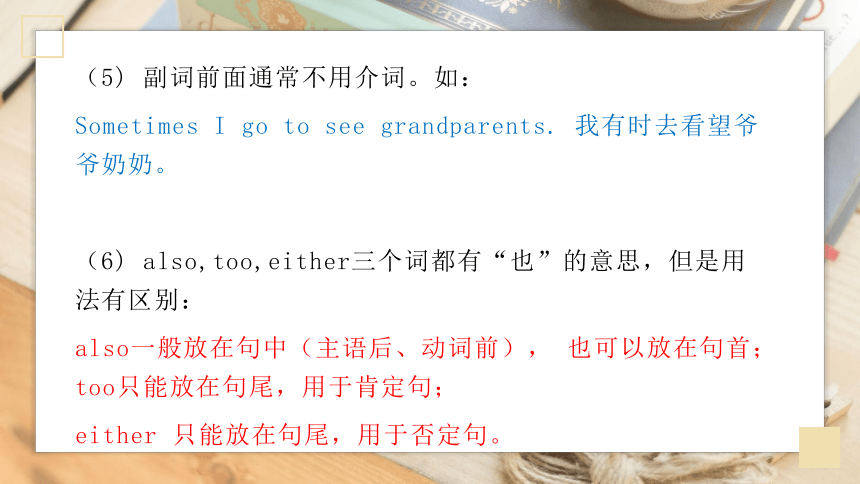
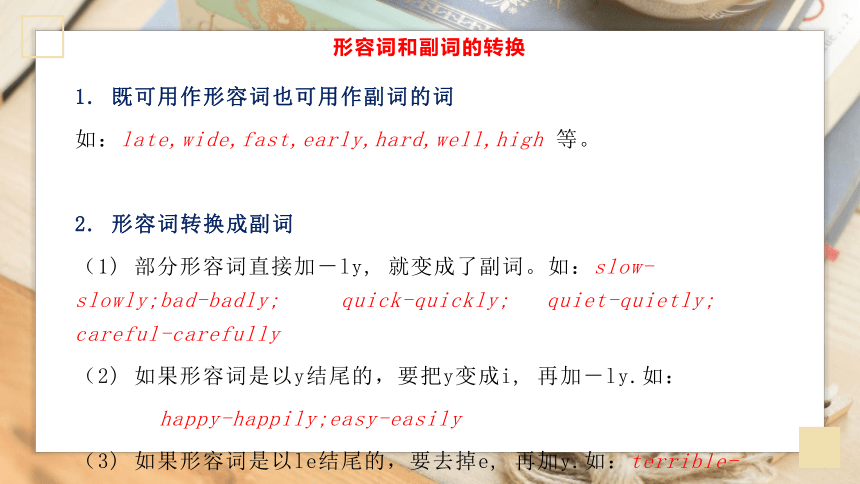
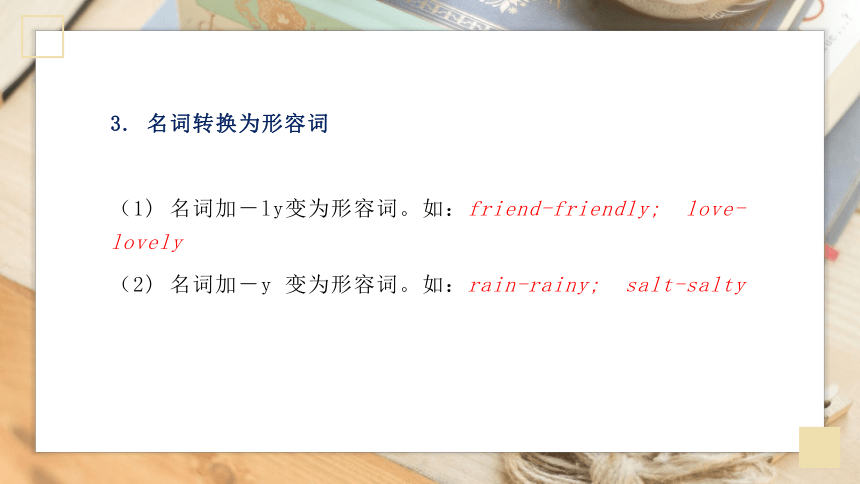
文档简介
(共24张PPT)
形容词、副词
小升初
词汇
形容词
用来修饰名词,表示人或事物的性质、状态和特征的词,叫形容词。
形容词常作定语(放在名词前)、表语或宾语补足语。如:
beautiful
flowers
漂亮的花朵
Your
coat
is
too
small.
你的外套太小了。
The
old
woman
keeps
everything
clean
and
tidy.
那位老妇人让一切保持干净、整洁。
注意:
(1)
有些形容词只能作表语,如:alone,afraid,asleep,alike,ill等。
He
is
asleep.
他正在睡觉。
The
old
man
is
alone.
这位老人独自一人。
(2)
形容词用来修饰
something,anything,nothing,everything
等复合不定代词时,要放在:
这些词的后面。如:
You'd
better
tell
us
something
interesting.
你最好给我们讲一些有趣的事。
(3)
形容词名词化。有些形容词前加定冠词后变成名词,表示一类人,谓语常用复数。
这类词有:rich/poor;good/bad;young/old;healthy/ill;living/dead;black/white
(表示人种
等)。如:
The
young
should
take
good
care
of
the
old.
年轻人应该好好照顾老人。
副词
副词是用以说明动作或状态的特征、方式、程度、时间以及地点等的词。
副词在句子中主要是作状语,用来修饰动词、形容词和其他副词或整个句子等。
副词前一般不需要介词。副词在句子中的位置比较灵活,但也是有规律的。
(1)
时间和地点副词(now现在,today今天,tomorrow
明天;here
这儿,there
那儿)通常放在句末。如:
My
mother
cooks
supper
at
home
every
day.
我妈妈每天在家做晚饭。
(2)
方式副词(hard
努力地,carefully
小心地,happily
高兴地,slowly
慢慢地)在修饰动词时,放在动词后面。如:
Run
to
school
quickly.
快速跑向学校。
(3)
频度副词(always永远,usually
经常,often
常常,sometimes
有时候,seldom
很少,never从不)通常位于be
动词和助动词后,行为动词前。如:
I
usually
play
football
after
school.
我通常放学后踢足球。
(4)
时态不同,时间状语也不一样。如:
She
went
to
Beijing
last
summer.
她去年夏天去了北京。
She
will
go
to
Beijing
next
summer.
她明年夏天将要去北京。
(5)
副词前面通常不用介词。如:
Sometimes
I
go
to
see
grandparents.
我有时去看望爷爷奶奶。
(6)
also,too,either三个词都有“也”的意思,但是用法有区别:
also一般放在句中(主语后、动词前),
也可以放在句首;too只能放在句尾,用于肯定句;
either
只能放在句尾,用于否定句。
形容词和副词的转换
1.
既可用作形容词也可用作副词的词
如:late,wide,fast,early,hard,well,high
等。
2.
形容词转换成副词
(1)
部分形容词直接加-ly,
就变成了副词。如:slow-slowly;bad-badly;
quick-quickly;
quiet-quietly;
careful-carefully
(2)
如果形容词是以y结尾的,要把y变成i,
再加-ly.如:
happy-happily;easy-easily
(3)
如果形容词是以le结尾的,要去掉e,
再加y.如:terrible-terribly
3.
名词转换为形容词
(1)
名词加-ly变为形容词。如:friend-friendly;
love-lovely
(2)
名词加-y
变为形容词。如:rain-rainy;
salt-salty
形容词和副词的比较级、
最高级及其用法
形容词和副词的比较级、最高级的规则变化
情况
加法
例词
一般情况
直接加-er或-est
tall-taller-tallest
以字母e结尾的词
加-r或-st
nice-nicer-nicest
少数以“辅音字母+y”结尾的词
变y为i再加-er或-est
dry-drier-driest
重读闭音节末尾只有一个辅音字母的词
双写辅音字母,再加-er或-est
thin-thinner-thinnest
多音节和部分双音节词
在词前加
more
或
most
delicious-more
delicious-most
delicious
形容词和副词的比较级、最高级的不规则变化
原级
比较级
最高级
good,well
better
best
bad,
ill
worse
worst
many,
much
more
most
little
less
least
far
farther/
further
farthest/
furthest
形容词和副词比较级、最高级的用法
级别
比较程度
表达方式和意义
例句
备注
原级
同等程度
肯定形式
as+原级+as
(像······一样)
Art
is
as
interesting
as
music.
否定形式
not
+
so
(as)
+原级+as
(不如··
那样)
English
is
not
so
difficult
as
Science.
形容词和副词比较级、最高级的用法
级别
比较程度
表达方式和意义
例句
备注
比较级
不同程度
(通常用于两者比较)
比较级+than
(比······)
Jim
is
older
than
Lucy.
I
like
pork
better
than
beef.
比较级前面可以加much,far,
even,still,
a
lot,alittle,
a
bit
等表示程度
程度加深
比较级+and+比较级(越来越·····)
The+比较级,
the+比较级.
(越······,
越·····.
)
He
is
growing
taller
and
taller.
He
studies
better
and
better.
The
more
books
she
reads,the
better
she
understands.
形容词和副词比较级、最高级的用法
级别
比较程度
表达方式和意义
例句
备注
最高级
最高程度
(用于三者或三者以上)
the+最高级+of/in/among.
.
.
(最.
.
.
.
.
.
)
Spring
is
the
best
season
of
the
year.
Lin
Tao
jumped
(the)
farthest
of
all.
副词最高级前面的
the
往往可省略
一、单项选择
(
)
1.
—What
color
are
your
new
shoes?
—______.
A.
They
are
black
B.
They
black
C.
It's
black
(
)
2.
I
have
______
hat.
A.
red
new
B.
a
new
red
C.
new
and
red
(
)
3.
This
Maths
problem
is
______.
I
can
work
it
out
______.
A.
easy;
easy
B.
easy;
easily
C.
easily;
easy
(
)
4.
I'm
as
_______
as
my
brother.
A.
strong
B.
stronger
C.
strongest
(
)
5.
Danny
and
Peter
are
______.
A.
tall
B.
tallest
C.
taller
Keys:
1.
A
2.
B
3.
B
4.
A
5.
A
(
)
6.
The
tree
is
the
______
of
all.
A.
tall
B.
taller
C.
tallest
(
)
7.
She
is
_______
than
me.
A.
more
short
B.
short
C.
shorter
(
)
8.
I
like
______
very
much.
A.
greens
B.
green
C.
a
green
(
)
9.
—What's
he
_____?
—He
is
a
tall
and
strong
man.
A.
like
B.
color
C.
look
(
)
10.
My
brother
is
______
than
any
other
student
in
his
class.
A.
clever
B.
more
clever
C.
most
clever
Keys:
6.
C
7.
C
8.
B
9.
A
10.
B
二、写出下列形容词的比较级和最高级
1.
much
______
______
2.
young
______
_______
3.
good
_______
_______
4.
long
_______
_______
5.
short
_______
_______
6.
strong
_______
_______
7.
beautiful
_______
_______
8.
small
_______
_______
9.
little
_______
________
10.
thin
_______
_______
Keys:
1.
more;
most
2.
younger;
youngest
3.
better;
best
4.
longer;
longest
5.
shorter;
shortest
6.
stronger;
strongest
7.
more
beautiful;
most
beautiful
8.
smaller;
smallest
9.
less;
least
10.
thinner;
thinnest
三、用括号中所给词的适当形式填空
1.
My
brother
is
three
years
_______
(old)
than
me.
2.
Who
gets
up
______
(early),
Lily
or
Lucy?
3.
—Is
your
friend
_______
(young)
than
you?
—Yes,
she
is.
4.
She
is
______
(good)
than
Alice
at
swimming.
5.
—Whose
pencil
box
is
______
(big),
yours
or
hers?
—Hers.
Keys:
1.
older
2.
earlier
3.
younger
4.
better
5.
bigger
6.
—Who
is
______
(thin),
you
or
Lisa?
—Lisa
is.
7.
Tina's
legs
are
as
______
(long)
as
Nancy's.
8.
Henry
is
not
as
______
(tall)
as
the
other
boys.
9.
He
______
(jump)
______
(high)
than
some
of
the
boys
in
his
class.
10.
My
cousin
swims
very
______
(well).
But
my
brother
swims
_______
(well)
than
my
cousin.
Keys:
6.
thinner
7.
long
8.
tall
9.
jumps;
higher
10.
well;
better
四、根据所给汉语完成句子
1.—你打篮球比你同班同学打得好吗?
—不,他们打得和我一样好。
—______
you
______
basketball
______
than
your
classmates?
—No,
they
_______
as
_______
as
me.
2.
我母亲比我父亲年龄小。
My
_______
_______
_______
than
my
_______.
3.
她的体重和我一样。
_______
weight
_______
as
________
as
_______.
Keys:
1.
Do;
play;
better;
play;
well
2.
mother
is
younger;
father
3.
Her;
is;
heavy;
mine
4.
我比我弟弟高。
I'm
taller
_______
my
brother.
5.
我的连衣裙太小了,我想买一条大的。
My
dress
______
too
______.
I
want
to
_______
a
_______
one.
Keys:
4.
than
5.
is;
small;
buy;
bigger
五、翻译下列句子
1.
She
is
thinner
than
me.
______________________________
2.
I
am
the
youngest
in
my
family.
______________________________
3.
Lisa's
coat
is
the
most
expensive
of
ours.
___________________________________
4.那个男人是三个人中最强壮的。
___________________________________
5.
他很瘦。他爸爸更瘦。他妈妈是他家最瘦的人。
_____________________________________
Keys:
1.
她比我瘦。
2.
我在我家里年龄是最小的。
3.
Lisa的帽子是我们之中最贵的一顶。
4.
That
man
is
the
strongest
of
the
three
people.
5.
His
thin.
His
dad
is
thinner.
His
mom
is
the
thinnest.
Thank
you!
形容词、副词
小升初
词汇
形容词
用来修饰名词,表示人或事物的性质、状态和特征的词,叫形容词。
形容词常作定语(放在名词前)、表语或宾语补足语。如:
beautiful
flowers
漂亮的花朵
Your
coat
is
too
small.
你的外套太小了。
The
old
woman
keeps
everything
clean
and
tidy.
那位老妇人让一切保持干净、整洁。
注意:
(1)
有些形容词只能作表语,如:alone,afraid,asleep,alike,ill等。
He
is
asleep.
他正在睡觉。
The
old
man
is
alone.
这位老人独自一人。
(2)
形容词用来修饰
something,anything,nothing,everything
等复合不定代词时,要放在:
这些词的后面。如:
You'd
better
tell
us
something
interesting.
你最好给我们讲一些有趣的事。
(3)
形容词名词化。有些形容词前加定冠词后变成名词,表示一类人,谓语常用复数。
这类词有:rich/poor;good/bad;young/old;healthy/ill;living/dead;black/white
(表示人种
等)。如:
The
young
should
take
good
care
of
the
old.
年轻人应该好好照顾老人。
副词
副词是用以说明动作或状态的特征、方式、程度、时间以及地点等的词。
副词在句子中主要是作状语,用来修饰动词、形容词和其他副词或整个句子等。
副词前一般不需要介词。副词在句子中的位置比较灵活,但也是有规律的。
(1)
时间和地点副词(now现在,today今天,tomorrow
明天;here
这儿,there
那儿)通常放在句末。如:
My
mother
cooks
supper
at
home
every
day.
我妈妈每天在家做晚饭。
(2)
方式副词(hard
努力地,carefully
小心地,happily
高兴地,slowly
慢慢地)在修饰动词时,放在动词后面。如:
Run
to
school
quickly.
快速跑向学校。
(3)
频度副词(always永远,usually
经常,often
常常,sometimes
有时候,seldom
很少,never从不)通常位于be
动词和助动词后,行为动词前。如:
I
usually
play
football
after
school.
我通常放学后踢足球。
(4)
时态不同,时间状语也不一样。如:
She
went
to
Beijing
last
summer.
她去年夏天去了北京。
She
will
go
to
Beijing
next
summer.
她明年夏天将要去北京。
(5)
副词前面通常不用介词。如:
Sometimes
I
go
to
see
grandparents.
我有时去看望爷爷奶奶。
(6)
also,too,either三个词都有“也”的意思,但是用法有区别:
also一般放在句中(主语后、动词前),
也可以放在句首;too只能放在句尾,用于肯定句;
either
只能放在句尾,用于否定句。
形容词和副词的转换
1.
既可用作形容词也可用作副词的词
如:late,wide,fast,early,hard,well,high
等。
2.
形容词转换成副词
(1)
部分形容词直接加-ly,
就变成了副词。如:slow-slowly;bad-badly;
quick-quickly;
quiet-quietly;
careful-carefully
(2)
如果形容词是以y结尾的,要把y变成i,
再加-ly.如:
happy-happily;easy-easily
(3)
如果形容词是以le结尾的,要去掉e,
再加y.如:terrible-terribly
3.
名词转换为形容词
(1)
名词加-ly变为形容词。如:friend-friendly;
love-lovely
(2)
名词加-y
变为形容词。如:rain-rainy;
salt-salty
形容词和副词的比较级、
最高级及其用法
形容词和副词的比较级、最高级的规则变化
情况
加法
例词
一般情况
直接加-er或-est
tall-taller-tallest
以字母e结尾的词
加-r或-st
nice-nicer-nicest
少数以“辅音字母+y”结尾的词
变y为i再加-er或-est
dry-drier-driest
重读闭音节末尾只有一个辅音字母的词
双写辅音字母,再加-er或-est
thin-thinner-thinnest
多音节和部分双音节词
在词前加
more
或
most
delicious-more
delicious-most
delicious
形容词和副词的比较级、最高级的不规则变化
原级
比较级
最高级
good,well
better
best
bad,
ill
worse
worst
many,
much
more
most
little
less
least
far
farther/
further
farthest/
furthest
形容词和副词比较级、最高级的用法
级别
比较程度
表达方式和意义
例句
备注
原级
同等程度
肯定形式
as+原级+as
(像······一样)
Art
is
as
interesting
as
music.
否定形式
not
+
so
(as)
+原级+as
(不如··
那样)
English
is
not
so
difficult
as
Science.
形容词和副词比较级、最高级的用法
级别
比较程度
表达方式和意义
例句
备注
比较级
不同程度
(通常用于两者比较)
比较级+than
(比······)
Jim
is
older
than
Lucy.
I
like
pork
better
than
beef.
比较级前面可以加much,far,
even,still,
a
lot,alittle,
a
bit
等表示程度
程度加深
比较级+and+比较级(越来越·····)
The+比较级,
the+比较级.
(越······,
越·····.
)
He
is
growing
taller
and
taller.
He
studies
better
and
better.
The
more
books
she
reads,the
better
she
understands.
形容词和副词比较级、最高级的用法
级别
比较程度
表达方式和意义
例句
备注
最高级
最高程度
(用于三者或三者以上)
the+最高级+of/in/among.
.
.
(最.
.
.
.
.
.
)
Spring
is
the
best
season
of
the
year.
Lin
Tao
jumped
(the)
farthest
of
all.
副词最高级前面的
the
往往可省略
一、单项选择
(
)
1.
—What
color
are
your
new
shoes?
—______.
A.
They
are
black
B.
They
black
C.
It's
black
(
)
2.
I
have
______
hat.
A.
red
new
B.
a
new
red
C.
new
and
red
(
)
3.
This
Maths
problem
is
______.
I
can
work
it
out
______.
A.
easy;
easy
B.
easy;
easily
C.
easily;
easy
(
)
4.
I'm
as
_______
as
my
brother.
A.
strong
B.
stronger
C.
strongest
(
)
5.
Danny
and
Peter
are
______.
A.
tall
B.
tallest
C.
taller
Keys:
1.
A
2.
B
3.
B
4.
A
5.
A
(
)
6.
The
tree
is
the
______
of
all.
A.
tall
B.
taller
C.
tallest
(
)
7.
She
is
_______
than
me.
A.
more
short
B.
short
C.
shorter
(
)
8.
I
like
______
very
much.
A.
greens
B.
green
C.
a
green
(
)
9.
—What's
he
_____?
—He
is
a
tall
and
strong
man.
A.
like
B.
color
C.
look
(
)
10.
My
brother
is
______
than
any
other
student
in
his
class.
A.
clever
B.
more
clever
C.
most
clever
Keys:
6.
C
7.
C
8.
B
9.
A
10.
B
二、写出下列形容词的比较级和最高级
1.
much
______
______
2.
young
______
_______
3.
good
_______
_______
4.
long
_______
_______
5.
short
_______
_______
6.
strong
_______
_______
7.
beautiful
_______
_______
8.
small
_______
_______
9.
little
_______
________
10.
thin
_______
_______
Keys:
1.
more;
most
2.
younger;
youngest
3.
better;
best
4.
longer;
longest
5.
shorter;
shortest
6.
stronger;
strongest
7.
more
beautiful;
most
beautiful
8.
smaller;
smallest
9.
less;
least
10.
thinner;
thinnest
三、用括号中所给词的适当形式填空
1.
My
brother
is
three
years
_______
(old)
than
me.
2.
Who
gets
up
______
(early),
Lily
or
Lucy?
3.
—Is
your
friend
_______
(young)
than
you?
—Yes,
she
is.
4.
She
is
______
(good)
than
Alice
at
swimming.
5.
—Whose
pencil
box
is
______
(big),
yours
or
hers?
—Hers.
Keys:
1.
older
2.
earlier
3.
younger
4.
better
5.
bigger
6.
—Who
is
______
(thin),
you
or
Lisa?
—Lisa
is.
7.
Tina's
legs
are
as
______
(long)
as
Nancy's.
8.
Henry
is
not
as
______
(tall)
as
the
other
boys.
9.
He
______
(jump)
______
(high)
than
some
of
the
boys
in
his
class.
10.
My
cousin
swims
very
______
(well).
But
my
brother
swims
_______
(well)
than
my
cousin.
Keys:
6.
thinner
7.
long
8.
tall
9.
jumps;
higher
10.
well;
better
四、根据所给汉语完成句子
1.—你打篮球比你同班同学打得好吗?
—不,他们打得和我一样好。
—______
you
______
basketball
______
than
your
classmates?
—No,
they
_______
as
_______
as
me.
2.
我母亲比我父亲年龄小。
My
_______
_______
_______
than
my
_______.
3.
她的体重和我一样。
_______
weight
_______
as
________
as
_______.
Keys:
1.
Do;
play;
better;
play;
well
2.
mother
is
younger;
father
3.
Her;
is;
heavy;
mine
4.
我比我弟弟高。
I'm
taller
_______
my
brother.
5.
我的连衣裙太小了,我想买一条大的。
My
dress
______
too
______.
I
want
to
_______
a
_______
one.
Keys:
4.
than
5.
is;
small;
buy;
bigger
五、翻译下列句子
1.
She
is
thinner
than
me.
______________________________
2.
I
am
the
youngest
in
my
family.
______________________________
3.
Lisa's
coat
is
the
most
expensive
of
ours.
___________________________________
4.那个男人是三个人中最强壮的。
___________________________________
5.
他很瘦。他爸爸更瘦。他妈妈是他家最瘦的人。
_____________________________________
Keys:
1.
她比我瘦。
2.
我在我家里年龄是最小的。
3.
Lisa的帽子是我们之中最贵的一顶。
4.
That
man
is
the
strongest
of
the
three
people.
5.
His
thin.
His
dad
is
thinner.
His
mom
is
the
thinnest.
Thank
you!
